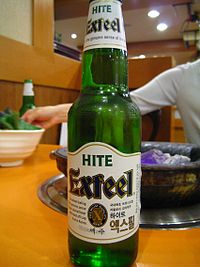 |
| Bad taste? Hite Exfeel |
The bizarre criticism of these prominent and generous South Korean advertisers from a magazine for economists may seem strange, but it is apparently based on the so-called 'oligopoly' in the domestic Korean market enjoyed by Hite Beer and OB Brewery. The economists – trying to also portray themselves as beer experts – blamed the bad taste not just on the oligopoly, but also an insufficient volume of malt used in making the beer.
South Korean beer companies have denied the allegations, saying that "Most (South) Korean beers contain more than 70 percent malt." So there is no truth to the allegation made in The Korea Times that at a typical Hite factory tour guides only stress the pristine quality of the region's water and nothing else because barley malt doesn't even have to be used - with the firm preferring to use cheap starch alternatives like rice, corn or potato instead or as little as 10 percent actual malt.
The brewers also point out that Hoegaarden, the Belgian beer that actually tastes like beer, is produced in South Korea under a local license – proving that they can make something pleasant to drink if they want to. However, they say there is no purpose in producing domestic beer of this quality, as statistically over 90% of Korean beers are consumed after the drinker is too drunk to taste anything.
So while some beer drinkers in South Korea do complain about the taste of domestic beer, statistically they are the 10% who have entered a physiological state medical experts refer to as 'sober' - which is, doctors say, when the body's sense of taste and feel returns. Anyone experiencing this distressing condition is advised to drink a bottle of Hite Exfeel immediately, followed by a bottle of Hite Exfeel, continuing until their blood-alcohol levels have returned to normal.
The Economist magazine ignores the fact that South Korean beers are exported around the world to countries which have large ethnic Korean populations who despite inexplicably leaving their homeland, refuse to abandon their diet of kimchi and beer. Yet despite this we are supposed to believe that Cass Fresh only has a rating of 1 out of 100 on ratebeer.com, while Hite is slightly better at 2 out of 100, which are both easily beaten by Taedonggang Beer with 7 out of 100. Meanwhile Hoegaarden scores an improbable 93 out of 100.
As for the oligopoly, this arose due to regulations that only granted a license to produce beer to a company that had the capacity to get the entire country drunk in an evening – calculated at 2.77 million liters or more. This rule was seen as sensible when it was drafted because everyone would be upset if five beers into the evening there was suddenly nothing left to drink but the gas from the car – and then how would drinkers drive home?
The Economist report includes many pieces of misguided information, but the debate it has incited will hopefully lead to richer-tasting beer in South Korea – not that we are implying in stating this that there is anything wrong with South Korean beer as it is, because there isn't.
Related Links
Criticism of S.Korean beer
42 percent of males binge drinkers
S. Koreans amongst world's heaviest drinkers
Break oligarchy and allow 'beer freedom'
Taedonggang
Oriental Brewery
Hite
Bitter taste mouth with white tongue?
Cass Fresh - ratebeer.com
Hite Beer - ratebeer.com
Taedonggang Beer - ratebeer.com
Hoegaarden - ratebeer.com
Disclaimer: Please note the links above are generated automatically by our software and may not always be directly related to the news article.


